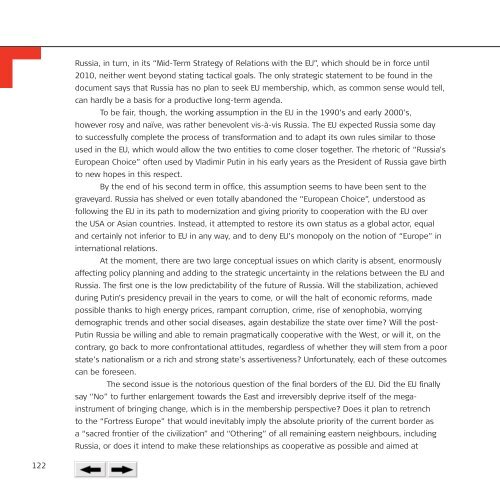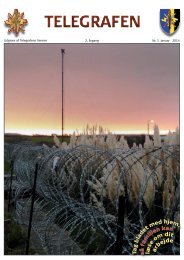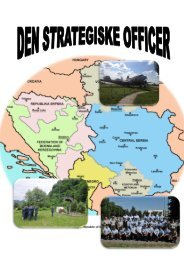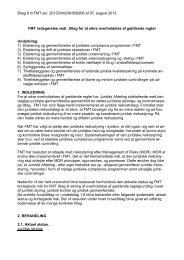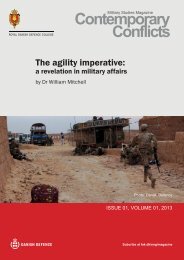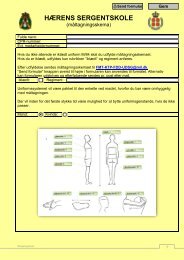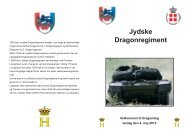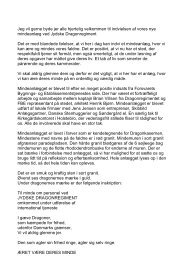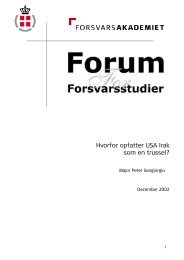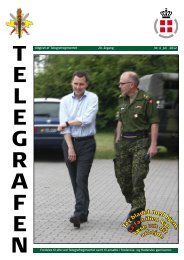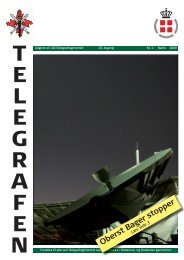Download PDF udgave
Download PDF udgave
Download PDF udgave
You also want an ePaper? Increase the reach of your titles
YUMPU automatically turns print PDFs into web optimized ePapers that Google loves.
122<br />
Russia, in turn, in its “Mid-Term Strategy of Relations with the EU”, which should be in force until<br />
2010, neither went beyond stating tactical goals. The only strategic statement to be found in the<br />
document says that Russia has no plan to seek EU membership, which, as common sense would tell,<br />
can hardly be a basis for a productive long-term agenda.<br />
To be fair, though, the working assumption in the EU in the 1990’s and early 2000’s,<br />
however rosy and naïve, was rather benevolent vis-à-vis Russia. The EU expected Russia some day<br />
to successfully complete the process of transformation and to adapt its own rules similar to those<br />
used in the EU, which would allow the two entities to come closer together. The rhetoric of “Russia’s<br />
European Choice” often used by Vladimir Putin in his early years as the President of Russia gave birth<br />
to new hopes in this respect.<br />
By the end of his second term in offi ce, this assumption seems to have been sent to the<br />
graveyard. Russia has shelved or even totally abandoned the “European Choice”, understood as<br />
following the EU in its path to modernization and giving priority to cooperation with the EU over<br />
the USA or Asian countries. Instead, it attempted to restore its own status as a global actor, equal<br />
and certainly not inferior to EU in any way, and to deny EU’s monopoly on the notion of “Europe” in<br />
international relations.<br />
At the moment, there are two large conceptual issues on which clarity is absent, enormously<br />
affecting policy planning and adding to the strategic uncertainty in the relations between the EU and<br />
Russia. The fi rst one is the low predictability of the future of Russia. Will the stabilization, achieved<br />
during Putin’s presidency prevail in the years to come, or will the halt of economic reforms, made<br />
possible thanks to high energy prices, rampant corruption, crime, rise of xenophobia, worrying<br />
demographic trends and other social diseases, again destabilize the state over time? Will the post-<br />
Putin Russia be willing and able to remain pragmatically cooperative with the West, or will it, on the<br />
contrary, go back to more confrontational attitudes, regardless of whether they will stem from a poor<br />
state’s nationalism or a rich and strong state’s assertiveness? Unfortunately, each of these outcomes<br />
can be foreseen.<br />
The second issue is the notorious question of the fi nal borders of the EU. Did the EU fi nally<br />
say “No” to further enlargement towards the East and irreversibly deprive itself of the megainstrument<br />
of bringing change, which is in the membership perspective? Does it plan to retrench<br />
to the “Fortress Europe” that would inevitably imply the absolute priority of the current border as<br />
a “sacred frontier of the civilization” and “Othering” of all remaining eastern neighbours, including<br />
Russia, or does it intend to make these relationships as cooperative as possible and aimed at


